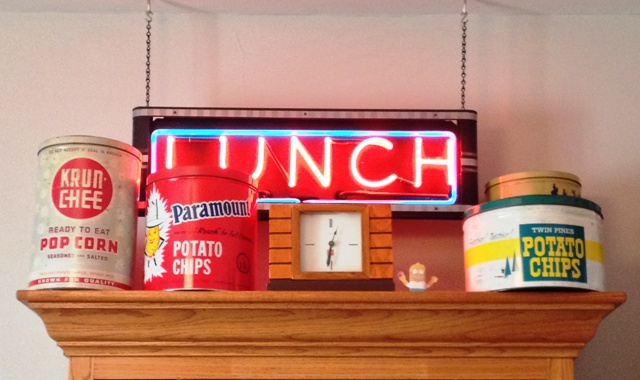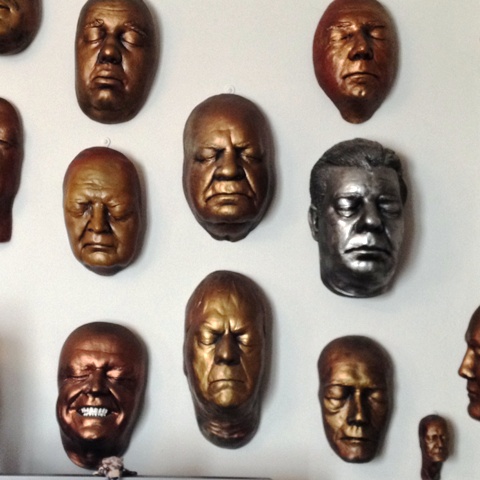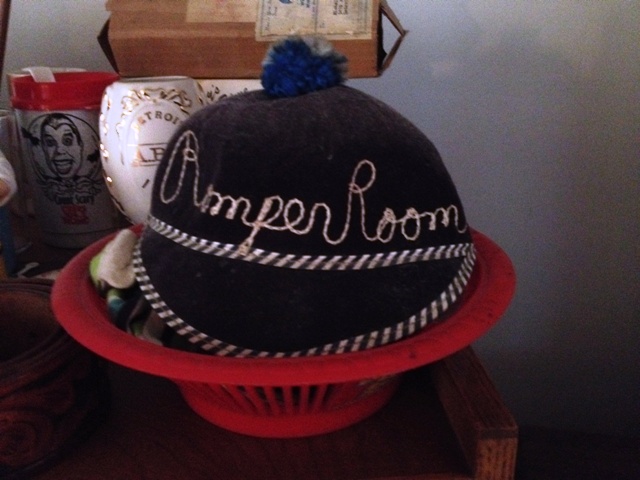
By Tracey Morris
Motor City Muckraker
Walk through Ed Golick’s front door and you’ll go back in time to the days when kids ate lunch with Soupy, dreamed of being friends with Bozo the Clown, and listened for their name during roll call on “Romper Room.” He lovingly describes his vast collection of books, photos, files, props, and tchotchkes as “the Bettman Archive of Detroit TV.” His role, once described by Time magazine as “Detroit’s TV expert,” is an inadvertent but treasured one.
“I never wanted to be a writer,” he said as he showed me the carefully maintained records he used to create the Detroit Kid Show Page, an irreverently written, highly respected clearinghouse of local television history from 1947 to 1970. “It just happened.”
Mr. Golick’s career as an archivist began about 15 years ago after he couldn’t find information about Sagebrush Shorty, a ventriloquist who hosted a kid’s show from 1955 to 1964. He soon began researching other beloved local TV personalities, which led to an ongoing partnership with Tim Kiska, a local journalist and professor.

Mr. Golick’s meticulous and incisive research was invaluable while Mr. Kiska wrote, “From Soupy to Nuts: A History of Detroit Television.” Mr. Kiska and Mr. Golick went on to co-author the book, “Images of America: Detroit Television,” which led to work on the Emmy-nominated WTVS documentary, “Detroit Remember When: The History of Detroit Television.”
Ed Golick’s success may not have been planned, but it is a reflection of his quiet but determined demeanor. In his home, many of his collectibles are displayed on a beautifully finished and sturdy hardwood cabinet complete with slide-out shelves he built himself.

He took up carpentry as a hobby years ago, and rather than start with something small, he said he wanted to go for it and build something substantial. He used those carpentry skills to build a cedar chest to store the original White Fang and Black Tooth puppets used on the classic TV show, “Lunch with Soupy.” The chest is a scale model of the Soupy house done from memory, using the few surviving kinescopes and videotapes of the show as reference for his design. He said he handcrafted the case to show the widow of Clyde Adler, the puppeteer who created the characters, that the puppets she gave to him as a thank you for his work and friendship would be forever cared for.
This sort of thoughtful detail is also a reflection of the man I grew to love and respect years ago. Mr. Golick and I met back in 1982 when I was a student at Northern High School, now the Detroit International Academy for Young Women, the only public all girls K-12 school in the state. He was the school’s audio/visual technician, responsible for running and maintaining all the electronic equipment. I was one of the students who read the daily announcements, and he ran the PA system.

We worked together every day for three very fun years. When we met for our interview earlier this month, it was the first time we’d seen each other in nearly 30 years. He was just the way I remembered – quiet, thorough, unassuming, with a droll sense of humor to help him work through challenges.
One such challenge came from Ollie Fretter, a local retail legend known for bragging in commercials that he’d give customers five pounds of coffee if he couldn’t beat their best deal. Mr. Fretter retired and left Michigan after his chain of appliance stores went bankrupt in 1996.
Mr. Golick couldn’t get Mr. Fretter’s permission to allow him to use the store’s iconic commercials on the Detroit Kid Show website so, in a playful reference to the store’s legacy, he designed a replica of the Fretter House Coffee label that can tape onto a soup can. His directions cover every detail, from first eating the soup to reminding users to “admire your handiwork” when done.

Mr. Golick is the first to admit his labor of love won’t make him rich. He plans to continue to work at the International Academy “until they have to carry me out,” but he’s going to continue his work as Detroit’s preeminent TV historian. Someone has to do it, he observed, so why not him?
It may have been unplanned, but helping Detroit’s fans turn back the hands of time is clearly a job Ed Golick loves.
Note: The 36th Annual NAIAS Michigan Chapter Emmy Award Gala is on Saturday, June 14th. “Detroit Remember When: The History of Detroit Television,” is nominated in the “Documentary – Historical” category. The DVD, along with other books and films that chronicle Detroit’s cultural history, can be purchased on the Detroit Kid Show website, www.detroitkidshow.com.
Tracey Morris
Tracey Morris is the author of, “You Said You Wanted to See Me Naked: An Autobiographical Poem Cycle.” Her work has recently been published by Rust Belt Chic Press, and she was a finalist in the 2013 Springfed Arts Writing Contest.
